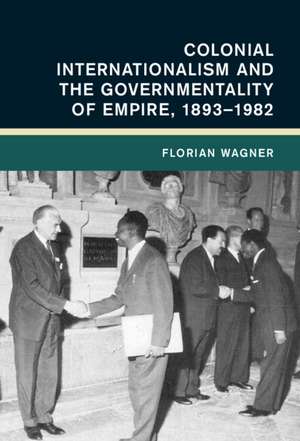Colonial Internationalism and the Governmentality of Empire, 1893–1982: Global and International History
Autor Florian Wagneren Limba Engleză Hardback – 23 feb 2022
Preț: 704.84 lei
Preț vechi: 791.96 lei
-11% Nou
Puncte Express: 1057
Preț estimativ în valută:
134.87€ • 141.19$ • 111.60£
134.87€ • 141.19$ • 111.60£
Carte tipărită la comandă
Livrare economică 05-19 aprilie
Preluare comenzi: 021 569.72.76
Specificații
ISBN-13: 9781316512838
ISBN-10: 1316512835
Pagini: 434
Dimensiuni: 160 x 235 x 31 mm
Greutate: 0.8 kg
Ediția:Nouă
Editura: Cambridge University Press
Colecția Cambridge University Press
Seria Global and International History
Locul publicării:New York, United States
ISBN-10: 1316512835
Pagini: 434
Dimensiuni: 160 x 235 x 31 mm
Greutate: 0.8 kg
Ediția:Nouă
Editura: Cambridge University Press
Colecția Cambridge University Press
Seria Global and International History
Locul publicării:New York, United States
Cuprins
Introduction; 1. “More Beautiful than the Nationalist Thought”? Colonialist Fraternization and the Birth of Transnational Cooperation; 2. A Transcolonial Governmentality Sui Generis: The Invention of Emulative Development; 3. Politics of Comparison: The Dutch Model and the Reform of Colonial Training Schools; 4. Cultivating the Myth of Transcolonial Progress: The ICI and the Global Career of Buitenzorg's Agronomic Laboratory; 5. The Adatization of Islamic Law and Muslim Codes of Development; 6. Creating an “Anti-Geneva Bloc” and the Question of Representivity; 7. Inventing Fascist Eurafrica at the Volta Congress; 8. False Authenticity: The Fokon'olona and the Cooperative World Commonwealth; 9. “That Has Been Our Program for Fifty Years”: Sustained Development and Loyal Emancipation after 1945; Conclusion.
Notă biografică
Descriere
Explores how the International Colonial Institute, a pervasive colonial think tank established in 1893, reformed colonialism to make empires last.

















